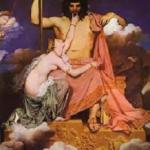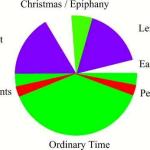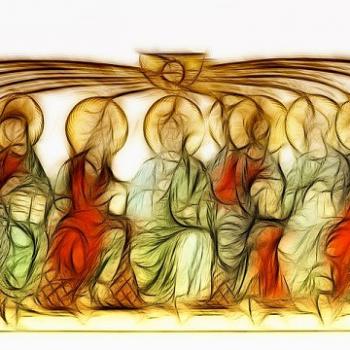It’s Trinity Sunday. Don’t worry, I’m not going to try to explain that very strange Christian doctrine—the one that has caused non-Christians over the centuries to occasionally accuse Christians, who claim to be monotheists, of being polytheists. In my youth, none of the things I was supposed to believe as a budding Christian was more confusing than the Trinity. I was familiar with “3-in-One Oil,” but this seemed different. “Think about an egg,” my Sunday School teacher suggested. “The egg has three parts—shell, white, and yolk—but it’s still one egg.” “Is Jesus the shell, white, or yolk?” I wanted to know. I was invited to spend the rest of that Sunday School session sitting out in the sanctuary by myself.

Over the years, it has become very clear to me that of all the supposedly seminal Christian doctrines, the doctrine of the Trinity has the least relevance to my daily attempts to live out my faith. This divine version of “separate but equal” really doesn’t matter much to me. But on this Trinity Sunday, I am reminded of the final week of my sabbatical fourteen years ago at an ecumenical institute in Minnesota.
The last week of that sabbatical happened to be the week between Pentecost and Trinity Sunday, the first week of Ordinary Time (more on Ordinary Time below). The benediction that closed morning, noon, and evening prayer at the Benedictine abbey up the road where I had become a regular had always been “Give praise to the Father Almighty, to his Son Jesus Christ the Lord, to the Spirit who dwells in our hearts, both now and forever, Amen.” All Trinity bases covered.
But on the first day of Ordinary Time, the benediction at noon prayer was strikingly different:
In the name of Your Son, our Savior, Jesus Christ,
Who lives and reigns and celebrates life,
With You and the Holy Spirit,
One God, forever and ever, Amen.
I was particularly struck by the “celebrates life” portion of the benediction. Growing up in a Baptist world, I don’t recall ever being introduced to the idea that the divine celebrates anything. Creates, judges, condemns, forgives (if you deserve it), yes—but celebrates? The thought of the Father, J.C., and the Holy Spirit celebrating life together as one God forever and ever was a new one. What would that look like?
My first image is of a Gary Larson-like cartoon. Imagine a round table. Seated on the left is an old, somewhat overweight guy with shoulder-length white hair and big white beard, wearing a white robe and drinking Lagavullin 16 neat. In the middle facing you is a sandaled and bearded younger guy with dark skin and hair hoisting a pint of his favorite craft stout (I recommend “Dragons Milk”), saying “Cheers” in Aramaic. On the right, facing the white-haired old guy, is a dove standing on the table and dipping her beak into a martini with two olives.
I guess it says something about me that my first image of celebrating life involves the consumption of alcoholic beverages, but it’s definitely a way of celebrating life. During the pandemic three ago, Jeanne and I spent a lovely evening at some friends’ house several blocks away, sitting at a proper social distance from each other and drinking. We talked and caught up as well, but we drank. I’m glad Jeanne and I walked there, because neither of us were fit to drive home. My friend (who is also a colleague in the philosophy department) and I compared notes early in the evening about the challenges of keeping alcohol consumption under control during Covid-19 seclusion; both of us admitted to have failed to do so on occasion.
Knowing that the Father, Son, and Holy Spirit consider celebrating to be right up there with living and reigning as important things on the divine check list is a reminder that there is always something to appreciate and celebrate. Beautiful weather (after a crappy April and first half of May). Flowers galore. My allergies have subsided. Fifteen to twenty miles per day on my bike. Jeanne and I are both healthy and fully employed. My sons and daughter-in-law are healthy and fully employed. And so on. You just have to be looking.
Trinity Sunday, which always is the Sunday after Pentecost, also reminds me that we have entered the longest stretch of the Christian liturgical year: Ordinary Time. Next to Lent, I have always found Ordinary Time, which stretches for endless weeks in green from Pentecost to the Sunday after Thanksgiving, to be the least attractive part of the liturgical calendar. Catholics and Episcopalians (as well as many other Christian denominations) follow the same liturgical calendar and readings—I recall that a fellow resident scholar at the ecumenical institute where I was spending four months of sabbatical fourteen years ago, who happened to be Catholic, told me that Ordinary Time was her favorite liturgical season. “Must be another one of those weird Catholic things,” I thought with appropriate Episcopalian disdain.
But “ordinary” has become more attracive post-pandemic, especially in the first weeks of my current sabbatical. Ordinary Time is a celebration of normalcy and of working out one’s salvation in the day-to-day grind. I recall that longing for things to “get back to normal” was a common wish for many during Covid-19. But “ordinary” is not the same as “normal.” There are many aspects of “normal” that have not and will not return, and there are many others that should not return.
As we enter Ordinary Time, each of us should make a list of things that we would like to see become “ordinary” going forward, things that we have dreamed of that we would like to see become part of our ordinary, daily lives. Here are a few things that I would like to see become “ordinary”:
- Universal health care for all citizens.
- Police and criminal justice reform that guarantees that all citizens of this country, regardless of race, gender, or sexual orientation, will be treated equally and fairly.
- Heightened concern for the environment that will help continue nature’s healing begun during Covid-19 seclusion.
- A permanent moratorium on electing former reality television personalities to public office.
What do any of the above have to do with the liturgical calendar? My answer is the same as it always is: I am a liberal because I am a Christian. My faith informs my political and social commitments, not the other way around. When Jesus refers to the Kingdom of Heaven, he is envisioning a transformed world now, one in which justice, peace, and love are the operative norms rather than dreams to be established in some future reality. Let’s make this season of Ordinary Time a season of renewed commitment to making such dreams an ordinary part of our daily reality.













